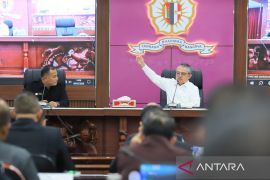Several readers have abandoned print media due to the development of digital technology.
The development of information technology has changed the form of media, from single media to multimedia.
There has been a shift in media consumption among members of the public over the past decade as is apparent from the downward trend in conventional media consumption from 2011 to 2021.
According to records collected on the bandwidth, record, and risky time in 2021, a decline in consumption mostly occurred in print media, which fell by around 50 percent; followed by television media, down 24 percent; and radio, with a nearly 19-percent drop.
On the other hand, desktop-based media consumption increased by 20 percent, while mobile-based media increased by more than 460 percent.
Minister of Communication and Informatics, Johnny G. Plate, urged the press to adapt to advancements in digital technology, such as big data, artificial intelligence, and metaverse.
This could enrich data and analysis for the production and distribution of media industry content, the minister explained.
A good media industry orientation will be reflected in quality journalism based on data, adequate analysis, and theoretical approaches, Plate noted at the 2022 National Press Day (HPN) Convention.
In the midst of the push for digital transformation globally due to the pandemic, digital transformation is also important for the press industry, so that it can find new media business models, the minister affirmed.
The use of data, which has increased lately, can allow companies to identify and target audiences more accurately, he noted.
In addition, the development of artificial intelligence would make it easier for companies to build personalized products and services for different audiences in line with their needs, he stated.
"Currently, in Indonesia, we are also rolling out and deploying 5G to respond to the emergence of various technologies as well as new digital media, such as metaverse, and cloud computing, which will further encourage shifts in production and consumption in the fields of communication, journalism, and media," Plate noted.
According to a report by The New York Times, nearly a third of content published by Bloomberg News journalists is created with the help of artificial intelligence or reporter robots, Plate highlighted.
The Huffington Post has also been utilizing big data since 2014 to optimize content, authenticate comments, ensure effectiveness, and manage placement in advertising, as well as create passive personalization, the minister stated.
This is a study from the Reuters Institute. One simple practice, big data, is being used to determine the most appropriate timing to publish an article or which platform is most suitable to be used for distributing an article, he added.
The minister remarked that metaverse technology has also enabled the emergence of new business models for the media industry. In 2003, a second life platform or virtual community had emerged that allowed users to create avatars and interact in the virtual world, he noted.
Plate stated that the online newspaper, The Second Life Environment, was present on the platform. The newspaper allowed virtual business owners and creators to advertise their services or products to consumers on the second life platform, he added.
Meanwhile, Plate noted that the government was drafting a regulation to support the improvement of the mass media ecosystem and empower the community.
The attempt is a response to the development of the media industry ecosystem and digital technologies, such as augmented reality, virtual reality, metaverse, artificial intelligence, and 5G, he remarked.
One of the goals of the regulation is to accommodate business and journalism orientation of the mass media industry. Thus, digital technologies can be optimally advanced and utilized for the benefit of the community, the minister remarked.
Indonesia has adequate regulations to anticipate the development of digital technology, such as Law Number 11 of 2008 and its amendment on Electronic Information and Transactions, he noted.
In addition, there are Government Regulation Number 71 of 2019 on the Implementation of Electronic Transaction Systems and the Communication and Informatics Minister Regulation Number 5 of 2020 concerning Electronic System Management on Private Scope, he remarked.
However, the government will continue to push for more regulations that can help sustain collaboration among mass media, publishers, digital platforms, as well as the media ecosystem in Indonesia, Plate added.
Currently, the government is preparing the legal framework to realize quality journalism, he remarked.
The framework will also regulate the responsibilities of digital platforms by considering the draft on publisher rights submitted by the Press Council and the Media Sustainability Task Force.
In addition, House of Representatives' (DPR's) Speaker Puan Maharani stated that the Indonesian press played an important role in tackling false information or hoaxes that spread among members of the public.
The influx of unbridled information, or infodemic, has permeated to public spaces through various digital platforms, according to Maharani. This phenomenon has frequently caused people to be exposed to hoaxes.
For instance, hoaxes on vaccine. Mass media has an important job to clarify such misinformation and hoaxes, she noted.
Journalists' current struggle is to help the public to receive accurate information, she remarked.
Journalists should function as gatekeepers to verify news on issues that spread among members of the public, she opined.
The speaker also expects the press to not forget its obligation to edify the public, especially since the press is the fourth pillar of democracy.
She also reminded the press to always stay true to its obligation to prioritize the general public.
To this end, she expects press workers to uphold the principle of fulfilling the public's rights to receive accurate, truthful, and even-handed information.
Speed should be followed by news accuracy. The key is that the press should be disciplined in conducting verification, be even-handed, and be independent, Maharani noted.
In the midst of technological disruption, the press must always be able to adapt and be more creative and productive.
The press must be able to maintain its credibility as a provider of information, increase accuracy, and maintain independence and objectivity.
A digital media platform must support transformation for the nation's progress and not merely be motivated to increase the number of viewers and subscribers owing to the desire to earn large amounts of money from digital content, but instead must be able to deliver messages of human values, justice, and shared prosperity.
Good journalistic work will yield several benefits to every aspect of society.
Editor: Rahmad Nasution
Copyright © ANTARA 2022












